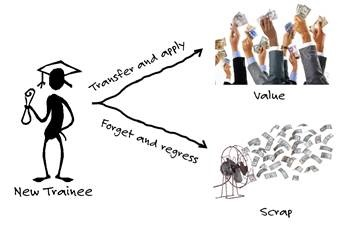ATD Blog
Stop Delivering Training Events
Mon Jun 16 2014

The reality is that training “events” don’t work. As learning professionals, it’s time we stopped delivering training events and started delivering performance improvement processes that have learning as a key component. As Linda Hudson, CEO of BAE Systems US Army, said in an interview in The Wall Street Journal, “You don’t go to a class and next week, everything changes.”
Companies invest in training and development to enhance capability and improve performance. However to improve performance, employees have to do things differently and better when they return to work. If they don’t change their behaviors back on the job, then performance won’t change, no matter how much they learned. As Einstein supposedly quipped: “One definition of insanity is to continue doing the same thing and expect a different result.”
People don’t change their behavior just because they learned something new. As we explained in our Infoline, “Ensuring Learning Transfer,” people need to apply what they learned once they return to work if training is to produce business value. Whether or not they do so depends on how they answer two questions: “Can I?” and “Will I?” Unless they answer “yes” to both, they will slide back into old habits and the training will go to waste. Getting value from training requires both great learning and great learning transfer. That is why we have to think beyond events.

The answer to the “Can I?” question is strongly influenced by the training itself. To say, “Yes, I can,” employees need to feel confident that they can competently perform the skills they were taught. The instructional design needs to include the right amount of content, and especially, adequate practice with feedback. However, the post-training environment also affects trainees’ belief that they can; their manager has to give them the opportunity, and they need job aids and other forms of performance support to boost their confidence.
Even if employees can perform in a new and better way, they need to be motivated to make the effort; they have to also say, “Yes, I will.” Many factors affect participants’ willingness to apply what they have learned; almost all of these factors occur in the post-training “transfer climate.” Support from the participant’s manager is key.
Indeed, a study at American Express concluded that “an immediate leader has the potential to either make or break any training effort.” Thus, learning professionals who ignore the post-training environment and see their jobs as simply putting on events are putting their jobs at risk. Getting a return on an investment in training is a process that needs to be managed as such and continuously improved—or as we like to say, “The real work begins when the training ends.”
If you want your training efforts to earn greater respect and produce even greater impact, think “process” not “event.” Plan for and influence the whole process by which training becomes performance.
If you want your training efforts to be rewarded with even greater impact, start with why. To learn more, join us at one of the upcoming ASTD Learning Transfer Certificate programs. The next program is online starting on September 22, 2014.
You've Reached ATD Member-only Content
Become an ATD member to continue
Already a member?Sign In
